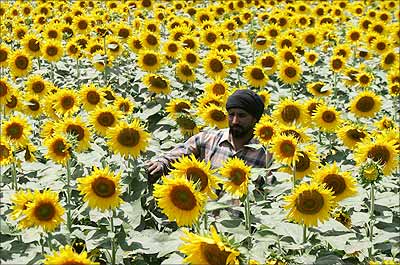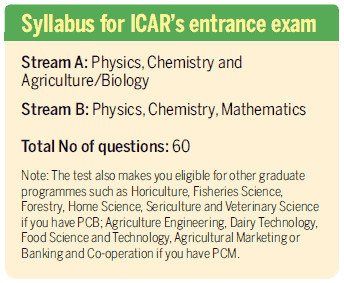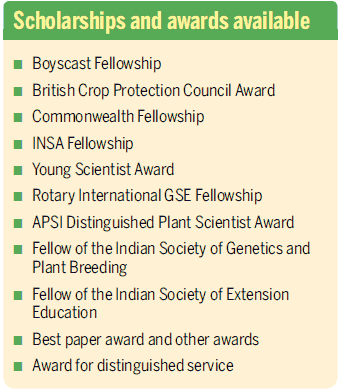
Agriculture plays a crucial role in the Indian economy. Almost 60 per cent of the Indian workforce is involved in agriculture, but that has not resulted in substantial growth of the sector. In fact, its contribution to the gross domestic product (GDP) has dwindled to less than 25 per cent. It is time that students explore this largely unknown arena.
Most students are well aware of streams like engineering and medicine, and postgraduate degrees like the MBA. But you may have not given any thought to a BSc in agriculture, in spite of the fact that agriculture is a part of the NCERT syllabus for Class 10+2 for science students, and you prepared the chapter for your board exams.
The demand for trained professionals in the field of agriculture is high. The course fee is negligible, barely Rs 5,000 per year. Scholarships are also available. A student who has completed a BSc in agriculture will get a well-paying job right after graduation.
It was in the mid-1960s, Dr DS Kothari, the then chairman of the UGC, proposed that each state should have at least one agricultural university, a move that was implemented across the country. This resulted in the setting up of 49 such universities, both by the state and the central government.
FAST FACTS
Best schools: GB Pant, TNAU
Qualifications: 10+2 with Physics, Chemistry, Biology and/or Mathematics as subjects (may vary)
Our advice: This degree provides an interdisciplinary experience catering to varied interests and aptitudes. It's advisable to pursue an MSc in Agriculture;
Careerscope: Agricultural departments, extension services, research organisations, financial sector with focus on agriculture, micro-finance institutions, academia, fertiliser companies, agri-biotech organisations, commercial farming players.
 Typically, a BSc in Agriculture is a four-year course, though some universities or institutes offer a five-year course. The curriculum vary, from learning about soil science to agricultural meteorology, and there is a balance between theory and practicals. Your last year will comprise hands-on training, which helps in tying up all you have learned in the first three years, to make you job-ready.
Typically, a BSc in Agriculture is a four-year course, though some universities or institutes offer a five-year course. The curriculum vary, from learning about soil science to agricultural meteorology, and there is a balance between theory and practicals. Your last year will comprise hands-on training, which helps in tying up all you have learned in the first three years, to make you job-ready.
Agriculture is very diverse and the curriculum allows you to choose areas of interest to you. "Students interested in physical, biological, chemical, and computer science can specialise, based on their interest and aptitude. Even an interest in engineering or journalism (writing about agriculture), finds an avenue here," shares Prof HS Gaur, dean and joint director (Edu), Indian Agricultural Research Institute.
Engineering enthusiasts can study agricultural engineering. If numbers and calculations excite you, you can take up mathematical statistics. Marketing has its own space within the field of agriculture, and so do chemistry and biology. You can also opt for agri-botany, agri-biotechnology, agri-chemistry, agri-economics, agri-extension, agronomy, agri-engineering and social forestry.
Depending on your aptitude, you will find ways to explore them in agriculture, especially in forecasting and productivity improvement domains.
Teaching, research and extension activities are three vital components of any agriculture college. Extension, which is applicable to all aspects of agriculture, allows you to take the knowledge you have accumulated back to the farmers through field trips, conferences or hands-on experience.
Choosing an institute
It is advisable to choose an institution, which is a member of the Indian Agricultural Universities Association (IAUA), established to promote agricultural research and education in India. Though agricultural universities churn out trained manpower, many jobs are handled by untrained people in this sector because the field is still largely unexplored.
Agriculture education is very standardised and extremely knowledge-based. The demand and supply is largely controlled, only those many students are churned out as per requirements.

You should have completed your 10+2 with physics, chemistry, biology and mathematics as subjects. Depending on the university, the eligibility varies in terms of a PCB/ PCMB/ PCA/ PCM combination. Typically, admission notifications appear in newspapers with the details such as application deadlines and specific quotas for the state, central, general and reserved candidates.
The admission process varies across universities, just visit the specific university websites.
The entrance exam
The Indian Council of Agricultural Research (ICAR), Krishi Anusandhan Bhavan, Pusa, New Delhi conducts the All India Entrance Examination for entry to 15 per cent of the total number of seats in graduate courses in State Agricultural Universities, National Dairy Research Institute, Karnal and Central Agricultural University, Imphal. The application deadline for this year's exam is over; however, check the websites of other agricultural universities for the upcoming deadlines.
Admission is solely based on an entrance test; there are no interviews and group discussions to stress you out, once you clear the exam! The broad arena of options available through this entrance exam includes subjects like agriculture, horticulture, fisheries science, forestry, home science, sericulture, veterinary science, agricultural engineering and dairy technology.

Agricultural giants such as ITC, Monsanto and Cargill, which are beginning to establish their presence in commercial farming as well as small farmer-led production initiatives are on the look out for young executives to handle extension services. Since agriculture is a priority area in achieving financial inclusion, many insurance companies and banks also recruit agriculture graduates.
Also, look at research and advocacy-based organisations such as Centre for Science and Environment (CSE). "Extension, that is, taking your expertise from the lab to the land and vice-versa, is the most challenging aspect," says Dr KM Manjaiah, registrar (Academic), IARI, enthusiastically.
For instance, the AME Foundation, an NGO which focuses on promoting agriculture in difficult circumstances, helps families which thrive on dry farming in Andhra Pradesh, Karnataka and Tamil Nadu.
Should I specialise?
However, you can also pursue an MSc or a PhD in a specific branch of study. Again, entry is based on an entrance exam. There are enough seats available for MSc students. As more students opt for MSc, agricultural universities can increase the number of seats available based on the specific state (view table for some universities offering higher studies).
"Many students quit their MSc programme mid-way, to join a job. Don't focus on only getting a job. You will get one of choice once you finish your degree. A scientist, for instance, starts with a basic salary of Rs 15,600. You get Rs 37, 200 in hand, and the growth prospects are all uphill," advises Prof Gaur. The Agricultural Scientist Recruitment Board is a great place to start, which currently has vacancies for 290 scientists.
If you go on to pursue an MBA in rural management, then you could work in agricultural finance, insurance, transportation, storage, grading and sales. You could also work in wholesale and retail marketing of agricultural products as well as managing private and/or cooperative businesses that sell or consume products of farmers. A specialised knowledge of the agricultural field is a requirement.
Making a difference
With its very low productivity levels, the sector offers tremendous potential for trained professionals. Besides picking up a gamut of information, you also get to practically apply it in the real world. "You make a difference to the economics of your country. Be honest, work sincerely and you will be amazed at the opportunities and satisfaction in store for you," concludes Prof Gaur.
Dr AK Sarkar, Dean, Birsa Agricultural University talks about the BSc course, its prospects and other aspects of taking up agriculture.
What are some of the qualities and skills needed for a career in agriculture?
You need a good, solid background in science education, especially subjects like mathematics, biology and physics. Good English language and communication skills are crucial. Students from a rural background have an edge as their exposure to farming is useful.
What does the course curriculum entail?
A general course curriculum covers all aspects of agriculture like agronomy, cultivation of crops and soil science, understanding natural resources and management. Agriculture extension is cucial, directly reflective of benefit to farmers.
How does geographical diversity influence the study of agriculture?
Variation in terms of geography is essential. For eg, Jharkhand is 29 per cent forest resources. Punjab and Haryana are 100 per cent irrigated and Bihar is river-irrigated as well. Jammu and Kashmir as well as the North East, demand an understanding of hilly track agriculture. A thorough knowledge about soil erosion, land degradation, acute water scarcity and dry land and rain agriculture is required.
And the job opportunities?
They are immense and the most opportunities at the moment are in banks and financial institutions. Centrally-funded projects, is another. Retail marketing, state governments and seed/fertiliser companies, also offer jobs. You can immediately get a job after a BSc or pursue higher studies. There's a dearth of assistant professors, and education and research is a decent area to opt for as well.